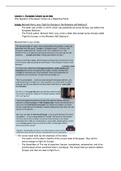1
Lecture 1. ‘European Culture’ as an Idea
(The Question of European Culture as a Departing Point)
Article: Bernard-Henry Levy ‘Fight for Europe or the Wreckers will Destroy It’
- The letter was written in 2019, which was published all across Europe, just before the
European Elections.
- The French author, Bernard Henri Levy wrote a letter that spread across Europe called
‘Fight for Europe, or the Wreckers Will Destroy It’.
Bernard-Henri Levy writes:
→ The words made bold lay the emphasis of this letter.
- The author of this letter is fearful of the current state of European. They call for
action/change to fight for Europe.
- The threat/fear of: The rise of populism, fascism, xenophobia, antisemitism, and of an
anti-European-Union sentiment that is increasing. This shows that we need to defend
Europe, and that we need to fight for it.
, 2
- The occasion for this letter was the European Parliamentary elections in 2019. They
were calling to the people of Europe to take action, and vote differently (fight to change
the tights).
- Pro-European Union powers managed to keep control of the Parliament.
- The national vote of the previous election went primarily to the populists in
France, Italy, and the UK.
- This was a tendency across Europe that the authors of this letter were warning
for.
(> In the quote above, the words ‘Battle’ and ‘Fight’ show that a war veteran is
employed here.)
‘European Culture’ on Wikipedia
- There is not one specific definition of culture.
- Question that can be asked is: Do these elements together define the European culture?
- And: Is European culture defined by the sort of subsequent heritage deriving from
antiquity, Christianity, the Renaissance, and humanism? As Bochmann argues above.
- Astrid (the lecturer) is more focused on these phrases (see below). Because she is
interested in viewing Europe post-colonialism, and viewing Europe in a global
perspective.
- On the one hand, we have these expressions on legality that guarantees human
rights and the liberty of the individual, and respect for peoples outside of
Europe. But then we also have colonialism.
- For Astrid, the sessions between these two are important to highlight. Because
during colonialism, the liberty of every individual and respect for people outside
of Europe did not exist in many cases.
> Example: Focusing on Europe as a Post-Colonialist.
> Wikipedia on European Culture continues a follows:
, 3
- European culture is presented as a civilization, and set apart from civilization.
- This poses several questions, such as:
- Does Europe have a common culture? Is this what unites Europeans? / And
what defines their Europiness?
- Are the cultural reference points that people turn to when they think of
European culture (such a Beethoven or Michelangelo) uniquely European? /
What does it mean to label certain artists as European?
- If we think that culture never really stops at the border, then great artists are also
already part of a broader cultural heritage.
- For contemporary Europeans might it also not be other cultural elements that define
their Europiness.
- The question of what would be European culture is not an easy one. And any definition
of European culture needs to be put in an historical context.
Articles: Peter Rietbergen & Jan Nederveen Pieterse
Rietbergen:
- Rietbergen talks about a Cultural Europe, that exists next to a geographical and a
political Europe.
- “A cultural Europe, that according to many, makes the political Europe next to a social
and economic Europe both logical and viable.”
- A cultural Europe that forms the basis for these other Europes.
- Rietbergen acknowledges that this history is to a large extent created/invented one.
- In the sense, that when we write the history of European culture, we have to
understand that this history is not a naturally given thing, but that it is written.
- > See quotes below.
- Europe is not a given entity with fixed attributes. But it is very much a changing
concept.
, 4
- Rietbergen searches for commonalities/connections across Europe. He wants to sketch a
grand narrative history that people across Europe share with one another.
- He does not set out to deconstruct this history. But he is aware of its constructed
nation.
- On the one hand, he recognizes that historians create stories, and that these are never
neutral for that reason, but that these are narratives.
- But he also says, the last quote (below). He gives importance to facts, not only fiction, in
history.
Nederveen Pieterse:
- Nederveen Pieterse would challenge Rietbergen on what is said above.
- He has a critical starting point, in that he states that the idea of European culture is
fiction. It needs to be deconstructed as fiction, not a story that is based on scientific
facts.
- He talks about the familiar story of Europe, ‘from Plato to Nato’.
- He starts with the origins of Europe, with Plato until Europe’s position within
NATO.
- According to Nederveen Pieterse, this story is wrong.
(Below quote states why it is wrong, and is written here as well:)
- It is wrong about the origins of European culture.
- It is wrong in the representation of European culture. As it only
represents a specific aspect of culture, and it overlooks other ones.
- It is wrong in representing the elite culture and not the popular culture.
For example, it says that ShakeSpeare is European, but popular hip hop
culture is not.
- It is wrong in defining European culture that is based on the past
(inherited civilization), and not taking into account Europe’s
contemporary multicultural reality.
- Thus, according to Nederveen Pieterse, this dominant story that we like to tell about
European culture is not in tune with what European culture actually is.





